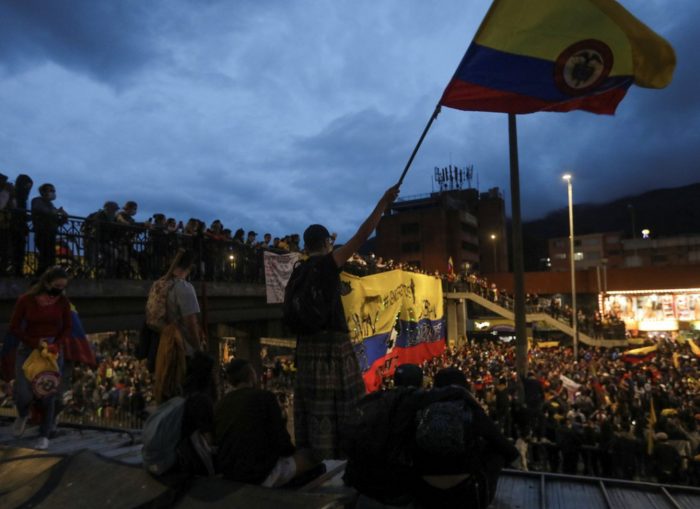*Editor’s Note: Elephant Journal articles represent the personal views of the authors, and can not possibly reflect Elephant Journal as a whole. Disagree with an Op-Ed or opinion? We’re happy to share your experience here.
~
You might have seen the videos of the ongoing riots in Colombia, but what is actually happening there, and why are we not talking about it?
Most of us are aware of the dire situation many Latin American countries are facing right now. Brazil is still struggling with COVID-19, Colombia is on the brink of a civil war, and Chile is on its way to changing its constitution.
While many of us (including myself) become Middle East experts with violence escalating between Israelis and Palestinians, most of us look away when it comes to the uproar in Latin America—why is that?
Let’s take a look at the underlying causes of the situation in Colombia. Protests originally started because of a tax reform that was already taken back by the government in April. The plan was to raise taxes on daily goods, incomes, and pensions to pay off the debt Colombia had accumulated over the last decades.
Colombia is not the only country in Latin America facing huge debt. Costa Rica, Argentina, Ecuador, Chile, and many others find themselves in a similar situation. When I was living in Costa Rica, taxes were also raised, and the uproar was not as intense as in Colombia right now, but it was obvious that the public was not too happy about these reforms.
The question is, “Who are these countries owing all that money?”
Just as in the Middle East conflict, there are no easy answers to this, but there are several reasonable explanations. Today, I would like to share one of these explanations with you.
When I was studying political science almost 20 years ago, I read a book called Open Veins of Latin America by Eduardo Galeano. The author explains how wealth is transferred from underdeveloped nations to developed nations by open trade. As the title already suggests, Galeano accused Europe (and later the United States) of exploiting Latin America. He feels that developed nations pay too little for natural resources and labor force in these countries and make them dependent by overtrumping the local economy.
Okay, enough of the political theory, let’s talk about Colombia. Many neoliberal economists had been praising Colombia throughout the last decade for their economic reforms that included privatization, opening markets to foreign investors, and raising taxes—Colombia took a similar route like Brazil and Chile, which turned them into an ally of the United States under the Trump administration.
But here comes the painful part that might explain why CNN would rather talk about the ongoing riots than the causes of this conflict: these opposing views are not exclusive to Latin America.
People in Latin America want access to healthcare, the absence of police brutality, education for everyone, and higher wages for the middle class. The system they are protesting is the system we already have in the so-called Western nations.
The struggle of Latin American farmers with multinational corporations is the same struggle we witness between Amazon and our local bookstore. It is the story of two competing business models: local economy versus powerful corporations.
The United States directly profit from these powerful corporations because Americans own them, but every dollar made by a multinational corporation basically leaves Latin America—these are the open veins of Latin America.
Maybe it is time to stop talking about how to (or not to) stop refugees from entering the United States and take a look at what made them refugees in the first place. Maybe our wealth is somehow based on the poverty of others?
I am aware that this is only one of many explanations for the current events in Colombia, and I am curious to learn more. If you are Colombian or live in Colombia, or Chile, or anywhere else in Latin America, please share your story with us.
What is your experience with foreign corporations, corrupt politicians, and the demand for basic human rights?









Read 3 comments and reply